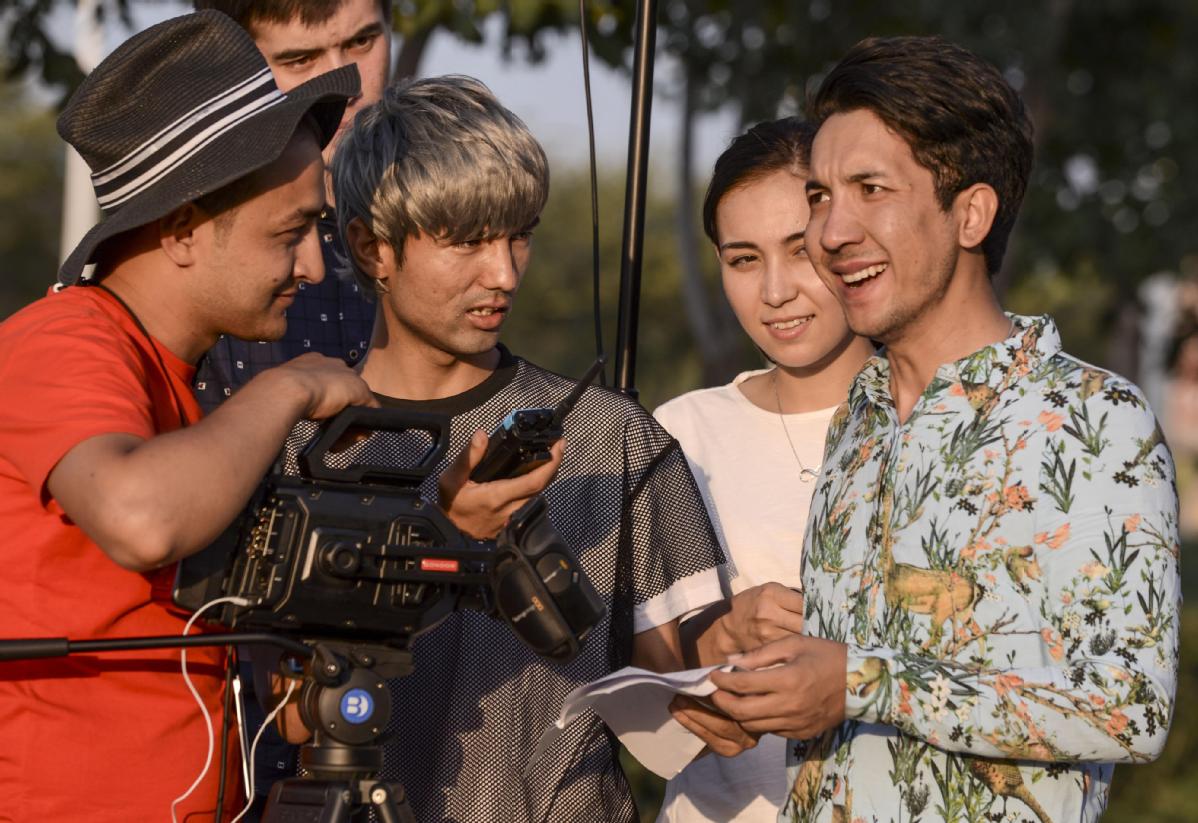Xinjiang troupe employs humor to win viewers


The pomegranate is one of the most famous fruits grown in the Xinjiang Uygur autonomous region, and its seed-filled interior holds symbolic meaning for locals, who use it to describe the close relationship between different ethnic groups.
Online comedy group Anar Pishti, whose name means "ripe pomegranate" in the Uygur language, is made up of a crew of multiple ethnicities, including Uygur, Kazakh and Han.
"Our sketches aren't created by just one person. Just as a pomegranate is not made of a single seed, you can't accomplish anything without a team," said Mehmettursun Mehmetli, who is known to millions nationwide for his lovable character Daodao.
Often depicted as a luckless country bumpkin struggling in the city, Daodao appears in several Anar Pishti sketches dressed like Elvis Presley, in shiny bell-bottoms and a garish shirt, but with a Jackson 5-style Afro.
His zany antics have led some to dub him Xinjiang's version of Mr Bean, the comic creation of British actor Rowan Atkinson.
Mehmettursun, 28, who is also a writer on the show, grew up in Kashgar, in the south of the region, and said he inherited his sense of humor from his parents. "They're fond of joking around," he said. "Even when they quarrel they tend to end it with a joke."
Yet it was not until he started his university studies in Shandong province in the early 2000s that he developed an interest in online humor.
Back then, the internet was starting to become a part of people's everyday lives, although Mehmettursun, who was studying computer science, found himself more attracted to watching funny videos than reading up on serious topics.
He said he also spent hours practicing lines from his favorite videos to make his spoken Mandarin more fluent.
In 2014, Mehmettursun landed a job as a customer service operator for a TV shopping channel based in Urumqi, the regional capital of Xinjiang, where he worked the phones for six months. There, he met budding screenwriter Hezreteli Yasin, and together they devised the idea for Anar Pishti.
The pair would write and rehearse scenes during their lunch break, and would record on evenings using a camera they had "secretly borrowed" from the company.
"Everything was going on behind closed doors," Mehmettursun said. "But one day, when we felt one of the channel's producers was in a good mood, we decided to show him one of our sketches. He could not help laughing. After that, he wanted to help us."
After attracting investors, Shiliuzi Cultural Media was established in 2016 to produce the show, and the first sketch was uploaded to Tencent Video and short-video platform Miaopai that year.
The early episodes were all in the Uygur language and focused on the lives of ordinary locals in Xinjiang, with the writers sometimes using sarcasm to express their thoughts about social trends. It was an instant hit among viewers in the region.
The show began receiving national attention after a three-minute sketch about two people bragging about their wealth went viral on Sina Weibo and WeChat in December 2016.
In the sketch, Daodao and a friend attempt to outdo each other, with one saying he uses his mobile data plan to read the news and watch movies, while the other counters that he plays the sports lottery every day. Finally, Daodao wins by saying his father "sells Xinjiang nutcakes".
The traditional snack became a hot topic in 2012, when netizens expressed outrage at a vendor in Xinjiang accused of charging inflated prices for his nutcakes.
After the success of the bragging sketch, Anar Pishti started winning plaudits from around the country for its satirical take on social phenomena.
"They see the world in an optimistic and positive way. By ridiculing an unpleasant incident, they helped remove some people's prejudice against Xinjiang," said Zhang Jianli, 30, a student of international politics at Peking University who is a fan of the show.
Mehmettursun said he believes humor can be a cure for conflict in society. "If someone makes fun of your height and you fight back with bad words, that's useless," he said. "I hope people will be more tolerant and sensitive to life's humor, as this may allow us to eliminate many prejudices."
Anar Pishti now has a crew of 30 people producing weekly videos about 10 months of the year. The show's account on Sina Weibo has almost 1 million followers, and each video receives tens of thousands of views.
Ethnic diversity is a main factor of the show and can be found not only in the languages the writers and performers use but also in their sources of inspiration.
"No matter where you're from, people love comedy," Mehmettursun said. "The world is full of people with the same sense of humor as me, and we need to stick together, like the seeds in a pomegranate, to bring happiness to more people."
- HK bets on integrated hub to enhance TCM profile
- China widens net in battle against graft
- New US dietary guidelines trigger widespread concern
- China eyes space leap with record satellite filings
- Team formed to investigate the loss of 29 cultural relics
- Investigation into school uniforms confirms safety of waterproof layer





































